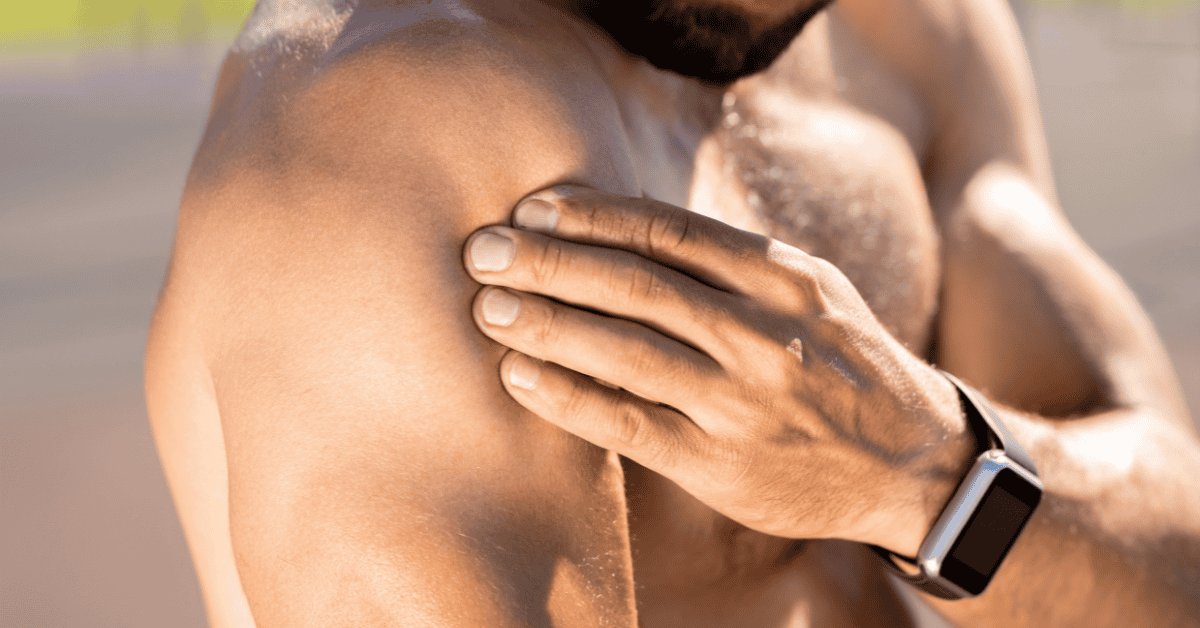
Ever felt that tingling sensation after gulping down your pre-workout shake?
You're not alone.
This phenomenon is quite common and has a scientific explanation.
Let's dive into the ingredients that cause this itch and understand why.
The itching sensation you feel after taking a pre-workout is most commonly due to Beta-Alanine, an amino acid included for its performance-enhancing benefits.
This itch, known as paresthesia, occurs when Beta-Alanine interacts with nerve receptors in your skin, and it's generally a harmless side effect that subsides over time.
Beta-alanine is a non-essential amino acid that's often included in pre-workout supplements.
It's known for its performance-enhancing effects, particularly in high-intensity workouts.

Beta-alanine works by buffering the acid in your muscles, allowing you to perform better in high-intensity workouts.
This buffering action is what leads to improved performance.
The itching sensation, known as paresthesia, occurs when Beta-Alanine binds to nerve receptors, causing a tingling sensation mostly felt on the skin of the face, neck, and back of the hands.
Beta-alanine isn't the only ingredient that can make you itch.
Let's consider other reasons...
Niacin, or Vitamin B3, can also cause flushing and itching.
It's often included in pre-workouts for its ability to improve blood flow.
Some pre-workouts contain ingredients that can release histamine in the body, leading to itchiness and redness.
Pre-workouts often contain stimulants like caffeine.
Excessive consumption can lead to jitteriness and insomnia.
Sticking to the recommended dosing is essential to avoid these side effects.
Here's more on stimulants in pre-workouts.
Certain pre-workout ingredients can interact with other supplements.
For instance, taking Beta-Alanine with Taurine can reduce the effectiveness of both.
Research shows that Beta-Alanine is generally safe, but excessive consumption can lead to tingling and flushing.
Beta-alanine is a naturally occurring non-essential amino acid.
Unlike other amino acids, it's not used to synthesize proteins.
Instead, it combines with another amino acid called histidine to form carnosine, which helps buffer acid in muscles.
Enduring the temporary itch from Beta-Alanine in pre-workout supplements is often worth it for the long-term performance benefits, which we'll delve into below.
As your body becomes more saturated with Beta-Alanine, the itching sensation generally decreases.
This makes the initial discomfort a small price for the gains in exercise performance and endurance that you'll soon discover.
One of the primary benefits of Beta-Alanine is its ability to improve exercise performance.
It's especially effective for high-intensity and short-duration exercises.
This study shows that Beta-Alanine supplementation can improve performance by 2.85%.
Beta-alanine helps buffer the acid in muscles, which can delay muscle fatigue.
This allows for more extended, more intense workouts.
Research proves that athletes who take Beta-Alanine can perform longer before experiencing muscle fatigue.
While not its primary benefit, some evidence suggests that Beta-Alanine could help increase muscle mass when combined with a regular exercise regimen.
The itching or tingling sensation you feel, known as paresthesia, is a common side effect of Beta-Alanine.
This occurs when Beta-Alanine binds to specific nerve receptors, causing small nerves under the skin to fire, leading to the tingling sensation.
One study shows that this sensation is harmless and usually subsides after an hour.

The itching is generally not harmful and is a sign that the Beta-Alanine is entering your system and starting to work.
However, if you experience extreme discomfort, lowering the dosage or consulting a healthcare provider might be a good idea.
If the itching becomes too uncomfortable, there are a few strategies you can employ:
By understanding the role and benefits of Beta-Alanine, you can decide whether this popular pre-workout ingredient is right for you.
When it comes to enhancing your workout, Beta-Alanine is a game-changer.
This amino acid has been the subject of numerous studies, and the consensus is clear: it offers a range of benefits that can take your fitness routine to the next level.
Let's break down these advantages.
One of the most compelling benefits of Beta-Alanine is its ability to improve high-intensity exercise performance.
Whether you're into sprinting, weightlifting, or high-intensity interval training (HIIT), this amino acid has covered you.
Research shows that Beta-Alanine helps improve performance in activities that last from one to several minutes, making it ideal for those bursts of intense effort.
Feeling the burn too soon?
Beta-Alanine can help with that.
By buffering hydrogen ions in your muscles, it helps delay the onset of muscle fatigue.
One study found that athletes who supplemented with Beta-Alanine experienced less muscle fatigue and could perform more reps during strength training exercises.
While Beta-Alanine is often associated with high-intensity workouts, it also has benefits for endurance athletes.
Some research suggests that it can improve performance in longer activities by helping to buffer acid over extended periods.
This can be particularly beneficial for cyclists, long-distance runners, and swimmers.
Though not its primary role, Beta-Alanine may contribute to muscle mass gains.
You're setting the stage for muscle growth when you can perform more reps and push through longer workouts.
It's a secondary benefit that comes with the territory of improved performance.
Believe it or not, Beta-Alanine isn't just about physical performance; it may also have cognitive benefits.
While the research is still in its early stages, some studies suggest that the increased carnosine levels from Beta-Alanine supplementation could have neuroprotective effects.
This could potentially improve focus and concentration during workouts, though more research is needed in this area.
By incorporating Beta-Alanine into your supplement regimen, you're not just getting an ingredient that makes you itch; you're investing in a proven performance enhancer to help you reach your fitness goals faster and more effectively.
Pre-workout supplements are ideal for athletes, gym-goers, and anyone looking to enhance their workout performance.
Individuals with pre-existing medical conditions, especially heart-related issues, should consult a healthcare provider before taking pre-workouts.

Why do I feel itchy after taking Beta-Alanine?
The itching sensation, also known as paresthesia, is a common side effect of Beta-Alanine. It's caused by its interaction with nerve receptors in the skin. The sensation is usually harmless and subsides after a while.
How long does it take for Beta-Alanine to kick in?
You'll typically start to feel the effects within 15 to 20 minutes of taking Beta-Alanine. The tingling sensation is often the first sign that it's starting to work.
Can I take Beta-Alanine every day?
Yes, Beta-Alanine is generally safe to take daily. However, consulting with a healthcare provider for personalized advice is always a good idea.
Is Beta-Alanine only for athletes?
While athletes and fitness enthusiasts are the primary users, anyone looking to improve their physical performance or cognitive function can benefit from Beta-Alanine.
Does Beta-Alanine have any side effects?
Apart from the tingling sensation, Beta-Alanine is generally well-tolerated. However, excessive doses can lead to nausea or tingling in the extremities.
Can I mix Beta-Alanine with other supplements?
Yes, Beta-Alanine is often included in pre-workout mixes that contain other ingredients like caffeine and creatine. Just be cautious of the total dosage of each ingredient.
Is Beta-Alanine vegan-friendly?
Most Beta-Alanine supplements are synthetic and not derived from animal sources, making them vegan-friendly. However, it's best to check the label to be sure.
How much Beta-Alanine should I take?
The commonly recommended dosage is between 2 to 5 grams per day. It's best to start with a lower dose and gradually increase it.
Does Beta-Alanine expire?
Like most supplements, Beta-Alanine has a shelf life, usually around two years. Always check the expiration date on the packaging.
Can I take Beta-Alanine on an empty stomach?
Taking Beta-Alanine on an empty stomach is generally safe, but some people report stomach discomfort. If that's the case, try taking it with a small meal.
The itchiness you feel after pre-workout is mainly due to Beta-Alanine, a non-essential amino acid.
While it can be a bit uncomfortable, it's generally harmless and can signify that the supplement is kicking in.
Always consult a healthcare provider if you have pre-existing conditions or concerns.
Useful Links
 About FitFrek
About FitFrekFitFrek operates as an independent platform, offering comprehensive workouts, programs, routines, guides, and unbiased reviews to accelerate your progress. We pride ourselves on our honesty, delivering straightforward and candid insights. FitFrek does not offer medical advice, diagnosis, or treatment services.